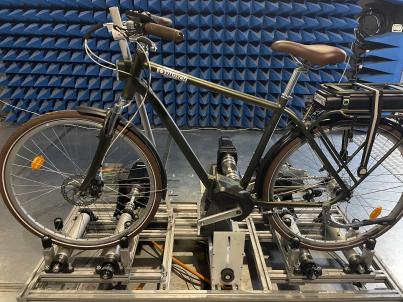The purpose of this test bench is to verify the compliance of an electrically assisted bicycle with EMC and electrical safety requirements (EN 15194).
Dedicated to the actors of sustainable mobility, this test bench for E-Bikes, designed in-house by our subsidiary EMC, was developed thanks to the skills directly derived from the know-how of our test bench design department.
Within the framework of the presumption of conformity with the essential requirements of the Machinery Directive 2006/42/EC, the EN 15194:2017 standard is in application for the evaluation of electrically assisted bicycles.
An E-bike, according to this standard, is defined by a maximum power assistance of 25 km/h, a maximum motor power rating that must not exceed 0.25 kW and the motor must be switched off as soon as the cyclist stops pedalling. The components of a bicycle equipped with an auxiliary electric motor, powered by a rechargeable battery, which will assist the user when pedalling.
Paragraph 4 of EN 15194:2017, describes the EMC and safety testing techniques that can be performed on the E-bike test bench.
This test bench, instrumented to measure: speed, power and torque on different axes, makes it possible to simulate a wide variety of human pedalling and thus to allow the servo-control of the E-bike on several standardised operating points.
We are thus able to put into operation any type of electrically assisted bicycle.
We have software that allows us to screen the different operating modes of the electrically assisted cycle in a semi-automated way.
There are different E-Bikes technologies on the market. Among the parameters that impact the functioning of the bench, we can mention for example: the place of the motor, located either on the front or rear hub, or in the crankset, as well as the mode of triggering of the pedalling assistance, which can intervene by simple detection of the rotation of the cranks or detection of the torque on the crankset, or a combination of both.
Features of the bench for 20-to-28-inch E-bike
 Mobile aluminium profile frame
Mobile aluminium profile frameEmitech Group - Legal information